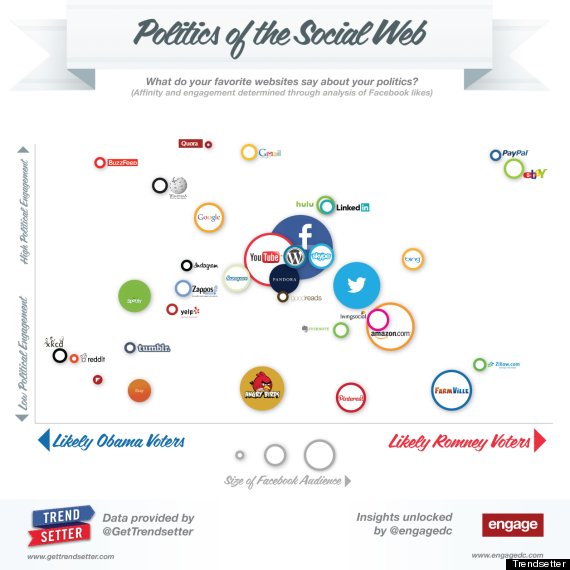
While it’s certainly no exact science, hidden in our online data are oodles of information about politics. Want to know the outcome of an election? Google might be able to tell you. Curious which candidate is most popular? Twitter can now offer up an answer.
And today, with the 2012 election on everyone’s mind, another natural question for data crunchers is: Can we tell whether someone would vote for Obama or Romney based on his or her favorite websites? Turns out we just might (with some generous assumptions).
Trendsetter, a research firm that studies social media, analyzed Facebook “likes” to try to tease out a connection between political leaning and online activity. The company defined the audience of a site as users who had "liked" it on the social network. From there, it counted the number of likes each candidate had received within the audiences of 33 popular websites and graphed the results: the greater the likes Romney scored among a site's users, the further to the right the site was placed on a chart (and vice versa for President Obama).
A similar approach went into arranging the vertical axis of the chart, which measures political engagement.
“We look at likers' propensity to like one of a number of political pages,” Patrick Ruffini, president of Engage, a public policy firm that co-created Trendsetter with the pollster Winston Group, wrote in an email to The Huffington Post. “It generally measures if that site's audience or likers also likes pages associated with politics, and to what degree.”
Here's what they got:
Now, an important caveat: Just as a retweet on Twitter isn’t an endorsement (as so many twitterers will tell you), liking a candidate doesn’t mean that a Facebook user will vote for him, or even really likes him.
Still, some interesting trends emerge from the data. Gathered dead center in the graph are Facebook, YouTube, Skype and Twitter, each extremely popular (and populous) sites that draw audiences from all across the political spectrum.
eBay, PayPal, Amazon.com and Bing lean toward Romney. With FarmVille, also leaning right, perhaps the fact that social gamers tend to be in their forties explains the party affiliation. Pinterest, famously popular with Midwestern moms, is center-right just like the region. Hip networks that are a hit among teens and twentysomethings, such as Instragram, Tumblr and Buzzfeed, like Obama as well, just as young people as a group generally support the president. Among the most pro-Obama pages are Reddit, XKCD, and to a lesser extent Wikipedia. Incidentally, these were also sites that joined many liberal groups in actively opposing the Stop Online Piracy Act, which critics claimed was am attempt by the federal government to censor the Internet.
And for any political operatives reading, Riffini sees sites with low political engagement as the best place, currently, to find new voters. (We're looking at you, Pinterest and FarmVille.)
"[V]isual pinboards and social games may be fertile ground for the campaigns to find new voters, as those sites often demonstrate defined political leanings combined with lower levels of political engagement," writes Ruffini in a blog post.
Are there any patterns in the chart that you see and we’ve missed? Let us know in the comments.
